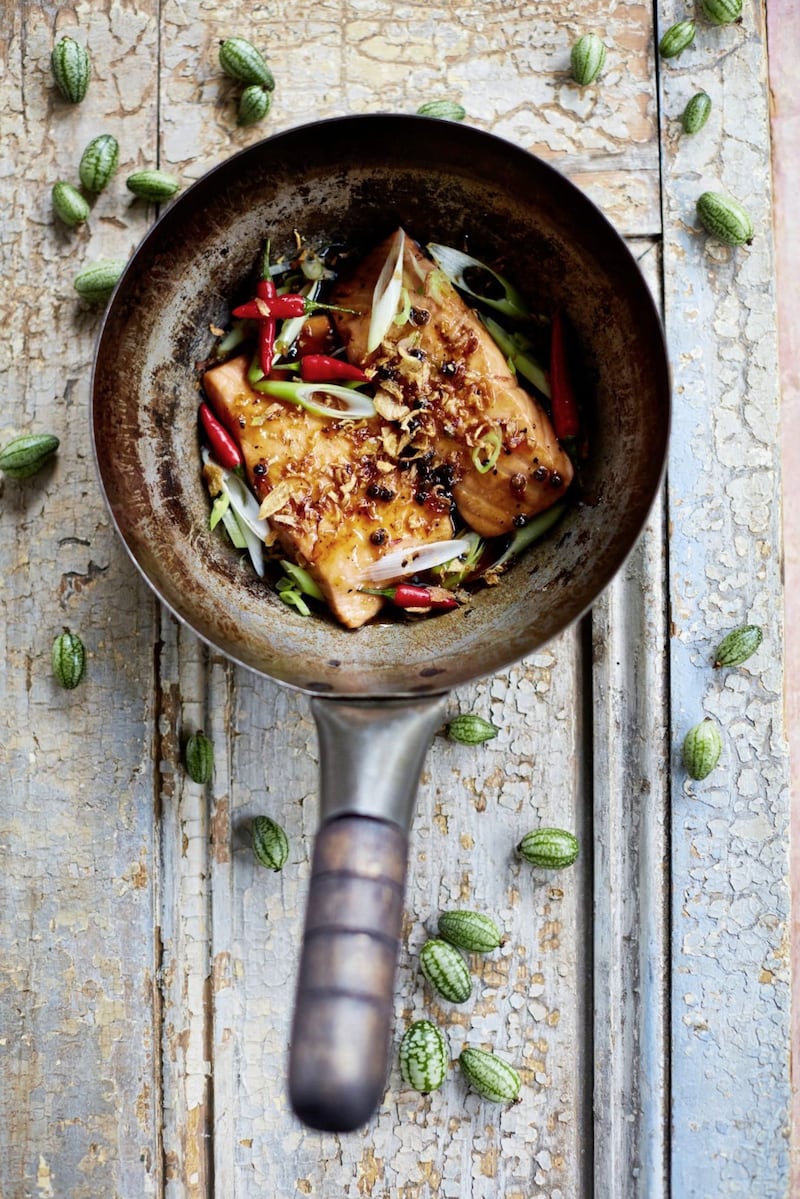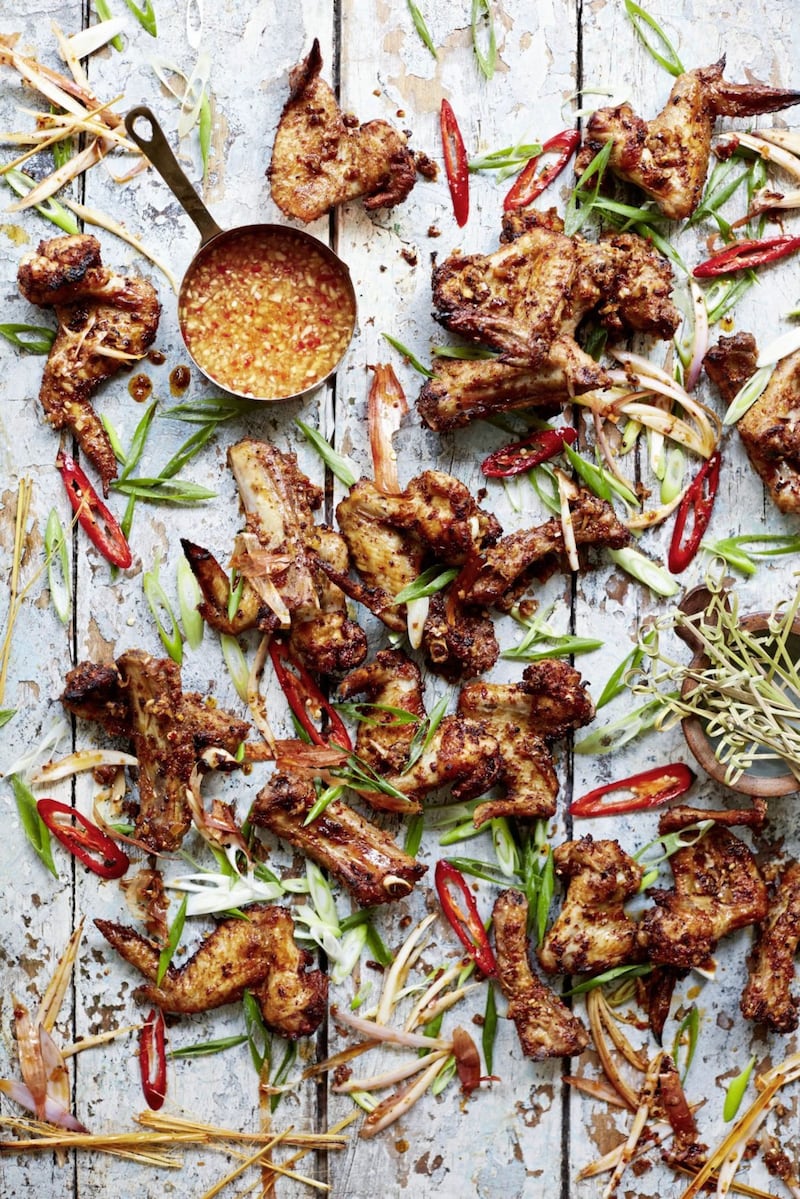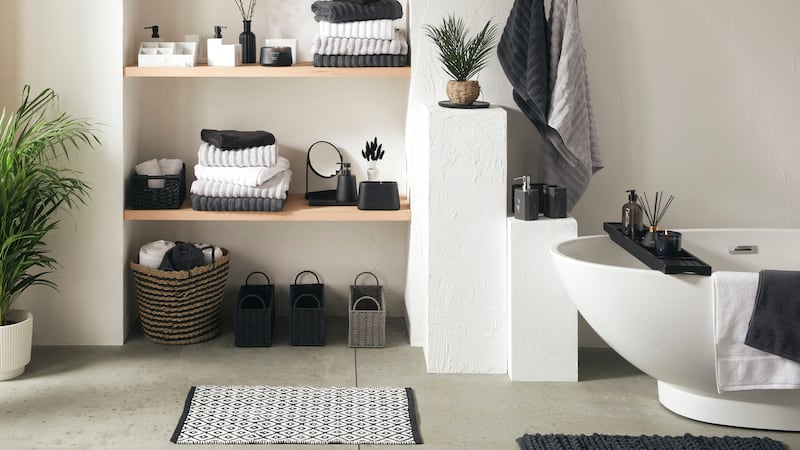THUY Diem Pham is a chatterbox and a feeder, of the loveliest order. At her supper clubs there might be five dishes on the menu but you're guaranteed to be served six or seven, the food appearing as she recounts stories of a childhood spent in Vietnam, walking barefoot picking "stinky but delicious" durian fruit, helping on her grandparents' farm and watching her mother make intricately layered broths.
Thuy (pronounced "Twee"), who is 36, moved to the UK aged seven, and three years ago quit a career in advertising to open a restaurant – and now has a cookbook to match. The move into food began with being so inspired by restaurant meals that she'd go home and recreate them, while "pretending I was a chef on TV", followed by a series of supper clubs (she and her husband and business partner, Dave, would drag their sofa up to their bedroom to make space for guests) and a blog. Things went so well that they eventually launched The Little Viet Kitchen (LVK) in north London.
The plan was to share "dishes from my village, dishes my grandma made that didn't really exist anywhere else", and to do it in a way that meant when you walked into the restaurant, you felt you were "being hugged".
"If you went to a Vietnamese home, my goodness, love is all you would feel," says Thuy. "In our culture, we don't cuddle or give kisses, but we do it through food. That's what brings us together."
Part of her mission is to get people to taste "the wonderful flavours" she grew up with – "We were not rich in money, but we were so rich in the love through our food," she recalls – and underpinning her philosophy is the belief that "food really tastes better if you understand it".
Thuy explains: "In our home cooking, we don't follow recipes, we follow the flavour and watch the ingredients we have. So if a tomato is a really dark red, it means there's no need to put in as much sugar and salt, but if it's green and a bit yellow, then you know it's harder, it won't be as sweet, but it's got a lovely tang to it, which means you need to balance that out – that's what my mum taught me, and I've kept all those tips with me, and I'm using them every day when I cook."
But if you didn't grow up among a family of Vietnamese women with exacting standards – Thuy was 33 when her mum finally said her cooking was 'OK' – who cooked food suffused with love, history, tradition and intuitive knowledge, you need a cookbook that'll show you the way. Hence Thuy's debut recipe collection, also called The Little Viet Kitchen.
From baked sea bass with lemongrass, chilli and ginger and sticky ribs, to caramelised coconut catfish and Vietnam's national dish, Pho (pronounced "fuh"), she acknowledges that it features some "really big recipes" – the kind you have to know if you truly want to fathom, and then master, Vietnamese cooking.
"They are time-consuming, but also real," she says. "We work and then we have 30 minutes to cook dinner, which is a shame, but the truth; save my book for the weekend, when friends and family come over, and actually spend some time in the kitchen."
You'll certainly need to set aside a day if you're to make her Pho, a shimmering broth laden with beef, fortified with oxtail and scattered with aniseedy Thai basil.
Thuy puts endless hours into her food, whether that means testing new recipes on her day off, or getting in at 1am from the restaurant and replying to all her social media comments before bed. "I look at my husband sometimes and I feel so bad – he's shattered, his life was great before he met me," she says with a laugh. "But it's so worth it."
Ask her what's going through her mind while she cooks, and she says: "I want to cook things that make me happy; when I'm cooking I want to transfer what I'm feeling. You hope that your flavours and your seasoning will have the power to make someone smile."
Then she adds: "I cook in fear a little bit – I just never want to become complacent. That fear makes me work harder and makes me taste everything 10 times. I stand at my pass and nothing goes out without me seeing that every detail on the plate is correct.
"That fear is because I want it to be perfect," Thuy concludes. "Cook with love – I know it sounds really corny."
:: The Little Viet Kitchen by Thuy Diem Pham, photography by David Loftus, is published by Absolute Press, priced £22. Below are three recipes from the book for you to try.

CARAMELISED SALMON AND GREEN PEPPERCORNS
(Serves 4)
500g salmon fillets
1tbsp vegetable oil
100g green peppercorns
250ml coconut water
For the marinade:
2tsp finely diced garlic
2 spring onions, white part only, finely diced
2tbsp soft brown sugar
3tbsp fish sauce
3tsp sesame oil
1tsp Caramel Sauce (dissolve 500g of granulated sugar in 125ml of water, add another 125ml water and cook until a rich dark reddish-brown colour)
To serve:
1 spring onion, sliced on the diagonal
1 or 2 red chillies, sliced on the diagonal
Crispy Fried Shallots (finely sliced shallots, deep-fried in vegetable oil until crisp)
Method
Place the salmon fillets in a bowl, add the ingredients for the marinade, and mix together well. Leave to marinate in the fridge for three hours. Take out of the fridge 30 minutes before cooking to allow the salmon to come to room temperature.
Lightly scrape the marinade from the salmon. You are aiming to remove all the bits in the marinade without removing too much of the marinade sauce. Leave the salmon to one side and reserve the marinade for later use.
Heat the oil in a saucepan over a medium heat until it reaches 160°C. An easy way to tell when the oil is ready is to place a wooden chopstick into it – when bubbles form on the surface of the oil it is ready.
Add the green peppercorns and stir-fry for one minute. Place the salmon, skin-side down, into the pan and cook for three minutes until the skin is crisp. Flip the salmon over and pour in the marinade and coconut water (avoid pouring onto the salmon skin, otherwise it will lose its crispiness). Keep the pan on the heat for a further four minutes until the salmon becomes sticky and golden in colour. Keep the ingredients moving during this process, as you don't want them to burn, but avoid moving the fish as this could cause the fillet to break apart.
Now you are ready to serve. Carefully transfer the salmon to bowls with a little of the cooking liquid. Sprinkle with the spring onion, chillies and shallots. This dish is best served with rice and/or a side of vegetables.
VIETNAMESE GARLIC BROCCOLI STIR-FRY
(Serves 2-3)
300g Asian broccoli, washed and dried
3tbsp sesame oil
6 garlic cloves, crushed
2tsp soy sauce
1tsp granulated sugar
1tbsp Chilli and Lemongrass Marinade (see below)
For the Chilli and Lemongrass Marinade:
(Makes approx 600ml)
200g dried shrimp
500ml vegetable oil
2tbsp finely diced garlic
10 spring onions, white parts only, finely chopped
1tbsp shrimp paste
1tsp dried red chilli flakes
2tbsp granulated sugar
1tsp salt
2tsp fish sauce
200ml chilli oil
vegetable oil
Method
Make the marinade: Soak the dried shrimp for 30 minutes in a bowl of warm water. Drain, pat dry with paper towels, then blitz in a food processor for 30 seconds to form a fine floss and set aside. Heat the oil in a saucepan over a medium heat until it reaches 160C. Add the garlic and the white parts of the spring onions, and fry for one to two minutes, or until the garlic starts to turn light golden in colour. Add the dried shrimp and shrimp paste to the pan and stir in the chilli flakes, sugar, salt and fish sauce. Reduce the heat to very low and cook for a further 20 minutes, stirring occasionally to stop the sugar from burning. Pour in the chilli oil and continue to cook for five minutes. Take the pan off the heat and leave the marinade to cool overnight, uncovered. Transfer to an airtight container or jar and pour over enough oil to cover the marinade mixture.
Bring one litre of water to the boil, and blanch the broccoli stems for 20 seconds then immediately submerge into a large bowl of cold water. Leave for 30 seconds, then take out and drain.
Heat the sesame oil to a medium heat in a small frying pan. An easy way to tell when the oil is ready is to place a wooden chopstick into it – when bubbles form on the surface of the oil it is ready. Add the crushed garlic, keeping it moving around the pan for approximately 10 seconds until the colour begins to change to a light brown.
Add the broccoli, soy sauce and sugar and toss for one minute, making sure the broccoli is coated evenly in the sauce. Remove the broccoli stems from the heat immediately, ensuring it remains al dente, and plate. Now drizzle over the chilli and lemongrass marinade and it's ready to serve.

LEMONGRASS AND CHILLI PORK RIBS AND CHICKEN WINGS
(Serves 4)
1kg chicken wings, any extra fatty skin removed
1kg pork ribs, washed and cut into single ribs
For the marinade:
8 lemongrass stalks, crushed and finely diced
12 Asian shallots, finely diced
4 bird's eye chillies, finely diced
3tbsp fish sauce
1tbsp soy sauce
3tbsp granulated sugar
1tbsp honey
1tbsp crushed black peppercorns
90ml sesame oil
To serve:
2 or 3 red chillies, sliced lengthways
100g spring onions, finely sliced on the diagonal
Pineapple Fish Sauce (see below)
For the Pineapple Fish Sauce:
(Makes approx 2l)
500ml lemon juice
750ml fish sauce
600g rock sugar, crushed
8 garlic cloves, diced
600g finely chopped pineapple
8 red chillies, finely chopped
Method
Make the Pineapple Fish Sauce: Put the lemon juice, fish sauce and sugar into a small saucepan set over a medium heat. Stir until the sugar has dissolved, then immediately set aside to cool. Stir in the garlic, pineapple and chillies and mix well. Will keep up to three months in the fridge.
In a bowl, combine all the ingredients for the marinade and mix well. Pour half the mixture into a separate bowl and add the chicken wings. Thoroughly massage the marinade into the chicken wings and leave to marinate in the fridge for at least three hours, or ideally overnight. Repeat the process with the remaining marinade and the pork ribs. Take the meat out of the fridge at least 30 minutes before cooking to allow it to come to room temperature.
Grill or barbecue the chicken for 20-25 minutes, turning halfway through the cooking time. Grill or barbecue the pork ribs for 25-30 minutes, turning often until nicely browned.
Scatter with the chillies and spring onions and serve alongside the pineapple fish dipping sauce. You could serve this with rice or vermicelli noodles and a side salad. Alternatively, a good crusty baguette is always a crowd-pleaser.



